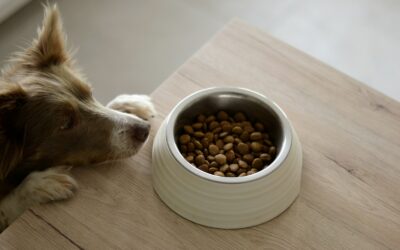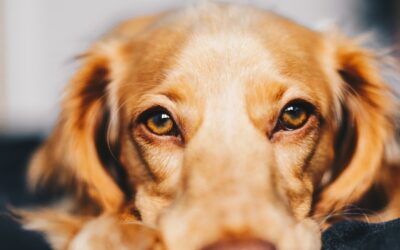Why does my dog eat poop?
If your dog is eating poop, you’re likely horrified, confused, and searching for answers. Rest assured, you’re not alone—and while this behavior might seem repulsive, it is surprisingly common among dogs. Understanding why your dog engages in this habit, also known as coprophagia, is the first step toward addressing it.
This blog dives into the reasons behind this odd behavior, how to stop your dog from eating poop, and when it might signal something more serious.

Why Do Dogs Eat Poop?
Dogs may eat poop for a variety of reasons, both behavioral and physiological. Some causes are harmless and tied to natural instincts, while others may indicate underlying medical or behavioral concerns.
Evolutionary Instincts
Dogs eating feces can be traced back to their evolutionary roots. Wild dogs evolved to eat feces—especially fresh stools—to keep their den clean and avoid attracting predators. Mother dogs are particularly prone to this behavior. After giving birth, they clean their puppies by licking away urine and feces, which ensures the den stays sanitary and free of odors.
Interestingly, puppies often mimic this behavior. Most puppies outgrow it by the time they reach adulthood, but some dogs retain the habit as they age.
Nutritional Deficiencies
In some cases, dogs may engage in coprophagia due to nutritional deficiencies. If their diet lacks essential nutrients, they may be driven to consume feces in an attempt to compensate for these deficiencies. Dogs require a balanced and nutritious diet to meet their nutritional needs, and inadequate nutrition can lead to abnormal behaviors such as eating poop.
To address this issue, it is crucial to ensure that your dog is receiving a well-balanced diet that provides all the necessary nutrients they require. Consult with your veterinarian to evaluate your dog’s current diet and determine if any adjustments or supplements are needed to meet their nutritional needs. A veterinarian can provide guidance on selecting high-quality dog food tailored to your dog’s specific requirements.
Additionally, it is essential to prevent access to feces, both their own and that of other animals, to discourage this behavior. Regularly clean up the yard and promptly remove any feces to minimize the opportunity for your dog to engage in coprophagia. By addressing nutritional deficiencies and implementing proper waste management, you can help discourage your dog from consuming feces and promote their overall health and well-being.
Medical Conditions
While nutritional deficiencies and behavioral factors can contribute to coprophagia, there are certain medical conditions that may also cause dogs to engage in this behavior. It is essential to be aware of these conditions and seek veterinary advice if you suspect any underlying health issues. Here are a few medical conditions that can lead to dogs eating feces:
- Malabsorption Disorders: Dogs with malabsorption disorders may have difficulty absorbing nutrients from their food, leading to nutritional deficiencies. In an attempt to compensate for these deficiencies, they may resort to eating feces.
- Exocrine Pancreatic Insufficiency (EPI): EPI is a condition where the pancreas fails to produce enough digestive enzymes, resulting in poor digestion and nutrient absorption. Dogs with EPI may exhibit coprophagia as they try to obtain essential nutrients that their body is not adequately absorbing.
- Intestinal Parasites: Parasitic infections like hookworms or whipworms can cause gastrointestinal distress and malabsorption in dogs. In some cases, dogs may consume feces as a means to alleviate discomfort or to eliminate the parasites.
- Underlying Health Issues: Certain medical conditions, such as diabetes, thyroid disorders, or Cushing’s disease, can affect a dog’s metabolism and contribute to abnormal behaviors like coprophagia. Treating the underlying health issue may help alleviate the behavior.
If you observe persistent coprophagia in your dog, it is crucial to consult with your veterinarian to rule out any underlying medical conditions and receive appropriate treatment. Your veterinarian can conduct diagnostic tests, recommend dietary adjustments, and provide guidance to address any health issues that may be contributing to this behavior.4. Anxiety or Stress
Behavioral factors like anxiety, loneliness, or stress may lead a dog to eat their own poop to self-soothe. Dogs left alone for extended periods or those punished harshly may develop this unwanted behavior as a coping mechanism.
Anxiety and Stress: Contributing Factors to Coprophagia
Anxiety and stress can play a significant role in dogs engaging in coprophagia, the behavior of eating feces. Just like humans, dogs can experience various forms of anxiety and stress that can manifest in different behaviors, including the consumption of poop. Here are a few reasons why anxiety and stress may contribute to coprophagia in dogs:
- Separation Anxiety: Dogs with separation anxiety from their dog owner may resort to coprophagia as a coping mechanism when they are left alone for extended periods. The behavior may provide a temporary distraction or a source of comfort.
- Fear and Anxiety-Inducing Environments: Stressful environments, such as crowded or noisy spaces, unfamiliar surroundings, or traumatic experiences, can trigger anxiety in dogs. Coprophagia may occur as a result of heightened stress levels and the need to self-soothe.
- Boredom and Lack of Mental Stimulation: Dogs that feel bored or under-stimulated may engage in coprophagia as a form of entertainment or to alleviate their boredom. This behavior can be a sign that they require more mental and physical exercise.
Addressing anxiety and stress in dogs is crucial to help mitigate coprophagia. Providing a calm and enriching environment, regular exercise, mental stimulation, and positive reinforcement training can help alleviate anxiety and stress levels in dogs. If the behavior persists or intensifies, consulting with a veterinarian or a professional dog behaviorist is recommended to determine the underlying causes and develop a tailored treatment plan for stool eating.
Common Types of Poop-Eating in Dogs
Understanding your dog’s behavior further means recognizing the context in which they consume feces.
- Eating their own poop: Often tied to stress, dietary problems, or learned behavior from puppyhood.
- Eating poop from other dogs: Dogs may find the feces of other canines especially appealing due to dietary differences or the presence of undigested food.
- Eating poop from other animals: This commonly includes cat litter, horse manure, or even wild animal stools. These stools often contain remnants of high-fat diets or plant materials that intrigue dogs.
- Eating fresh poop: Fresh stools, in particular, may hold more odor and taste appeal for dogs compared to older, dry feces.

How to Get Your Dog To Stop Eating Poop
While this habit can be frustrating, there are effective ways to prevent poop-eating in dogs.
Rule Out Medical Conditions
Before taking action, have your dog checked by a veterinarian to rule out any medical causes, such as intestinal parasites, nutritional deficiencies, or thyroid issues. This will ensure the problem is behavioral rather than health-related.
Feed a Balanced Diet
A well-rounded diet is crucial for reducing nutritional deficiencies in your adult dog. High-quality dog food rich in necessary enzymes, proteins, and nutrients can reduce the urge to eat poop. Speak with your veterinarian if you suspect your dog’s diet is not meeting their nutritional needs.
Use Positive Reinforcement
Positive reinforcement is one of the most effective ways to correct undesirable behavior. When your dog avoids poop, reward them with a treat, praise, or a favorite toy. Over time, they’ll associate avoiding stool with something rewarding.
Restrict Access to Poop
Control your dog’s environment to keep stools out of reach. Clean up waste in your yard promptly, and if your dog is indoors, avoid leaving access to cat litter boxes. For situations where you can’t restrict access entirely, consider using a leash to guide your dog away from poop during walks.
Add Stool Deterrents
Certain stool deterrents, available as supplements, can make poop less appealing to dogs. These are often mixed with your dog’s food and work by altering the taste and smell of their waste.
Address Emotional Triggers
If your dog eats poop due to anxiety, boredom, or stress, address these underlying triggers.
- Stimulate their mind: Dogs need plenty of mental and physical exercise. Increasing daily walks, playtime, or interactive games can all help.
- Create a stress-free environment: Reduce sources of anxiety, such as loud noises or long periods alone. Practice consistent positive interactions to build trust.
Break Their Habit Slowly
For dogs with deeply ingrained poop-eating habits, changing the behavior may take time. Using consistent commands like “leave it” and redirecting them to a toy or treat can reinforce new behaviors.
When to Seek Professional Help
While many dogs outgrow this bad habit, some need extra support. Professional training or working with an animal behaviorist can help you identify triggers for your dog’s poop-eating behavior and develop tailored strategies to stop it.
Additionally, if your dog continues eating feces despite all prevention measures, it’s crucial to revisit your veterinarian to rule out any overlooked medical conditions.

Final Thoughts | Why Does My Dog Eat Poop?
Although the act of eating poop might feel shocking or downright gross, your dog doesn’t see it the same way. Often, there’s an explanation rooted in instinct, health, or behavior. By understanding the causes, taking preventive steps, and consulting your veterinarian, you’re well on your way to curbing your dog’s poop-eating habit.
Remember, as a pet owner, empathy and patience go hand-in-hand. With time and consistent efforts, you can shift your dog’s behavior toward a healthier, happier life.
For more tips on addressing unusual dog behaviors, if your a dog owner, follow our blog or book a consultation with a certified animal behaviorist today!



